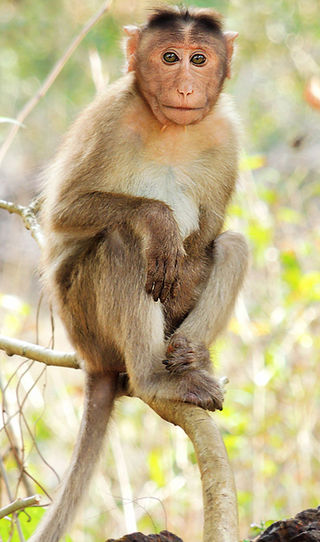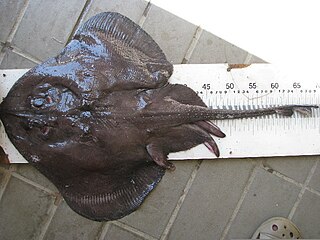
Mackerel is a common name applied to a number of different species of pelagic fish, mostly from the family Scombridae. They are found in both temperate and tropical seas, mostly living along the coast or offshore in the oceanic environment.

The macaques constitute a genus (Macaca) of gregarious Old World monkeys of the subfamily Cercopithecinae. The 23 species of macaques inhabit ranges throughout Asia, North Africa, and Europe. Macaques are principally frugivorous, although their diet also includes seeds, leaves, flowers, and tree bark. Some species such as the long-tailed macaque will supplement their diets with small amounts of meat from shellfish, insects, and small mammals. On average, a southern pig-tailed macaque in Malaysia eats about 70 large rats each year. All macaque social groups are arranged around dominant matriarchs.

The guenons are Old World monkeys of the genus Cercopithecus. Not all members of this genus have the word "guenon" in their common names; also, because of changes in scientific classification, some monkeys in other genera may have common names that include the word "guenon". Nonetheless, the use of the term guenon for monkeys of this genus is widely accepted.

The bigthorn skate is a species of fish in the family Rajidae. It is found in Equatorial Guinea, Gambia, Ghana, Guinea, Guinea-Bissau, Mauritania, Morocco, Namibia, Senegal, Sierra Leone, South Africa, Western Sahara, possibly Angola, possibly Benin, possibly Cameroon, possibly the Republic of the Congo, possibly Ivory Coast, possibly Gabon, possibly Liberia, possibly Nigeria, and possibly Togo. Its natural habitat is open seas.

Rajella is a genus of skate found deeper than 150 m (490 ft) in the Pacific, Atlantic and Indian oceans.
The ghost skate is a species of fish in the family Rajidae. It is found in Namibia and South Africa. Its natural habitat is open seas.
The leopard skate is a species of fish in the family Rajidae. It is found in Namibia and South Africa. Its natural habitat is open seas.
The blackish skate is a species of fish in the family Rajidae. It is found in Chile, Ecuador, and Peru. Its natural habitat is open seas.
The smoothback skate is a species of fish in the family Rajidae. It is found in Namibia and South Africa. Its natural habitat is open seas. Males can reach 70 cm in total length.
The Brazilian skate is a species of fish in the family Rajidae. It is found in Brazil and Chile. Its natural habitat is open seas. It is not well known but is thought to be threatened by bycatch of Patagonian toothfish.

Rajella lintea is a species of fish belonging to the family Rajidae.
Bigelow's ray, also called the chocolate skate or Bigelow's skate, is a species of skate in the family Rajidae. It is named in honour of the oceanographer Henry Bryant Bigelow.
The deepwater ray, also called the deepwater skate or abyssal skate, is a species of skate in the family Rajidae.

Rajella fyllae is a species of skate in the family Rajidae.






